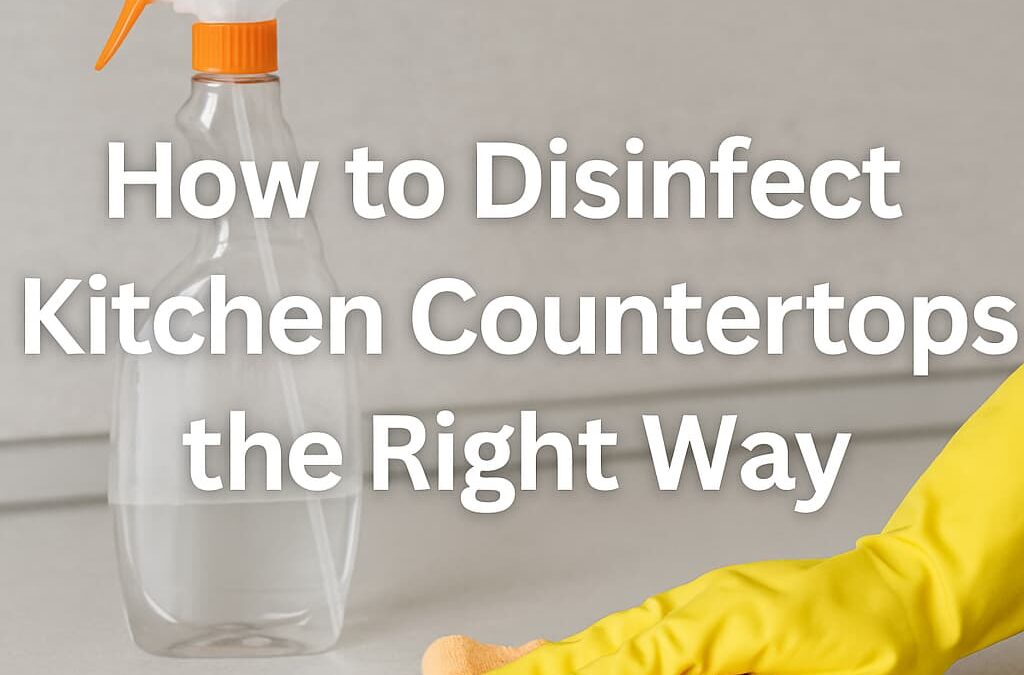Kitchen countertops are where food preparation happens daily, which means germs and bacteria are never far away. A simple wipe with soap may remove crumbs and grease, but it doesn’t always kill harmful pathogens. That’s where disinfection comes in.
But here’s the problem — not all disinfectants are safe for every type of countertop. Using the wrong method can damage surfaces like granite, marble, or wood. The good news? With the right approach, you can sanitize your kitchen safely and effectively.
This guide explains how to disinfect different countertop materials, which products are safe, and which mistakes to avoid.
Key Takeaways
- Cleaning and disinfecting are different — cleaning removes dirt, disinfecting kills germs.
- Use alcohol-based sprays (70% isopropyl) for quartz and laminate.
- Use stone-safe disinfectants on granite and marble — never vinegar or bleach.
- For butcher block, disinfect with vinegar, lemon, or hydrogen peroxide, then re-oil.
- Always wipe, disinfect, rinse (if needed), and dry.
Why Is Disinfecting Kitchen Countertops Important?
Kitchen counters face constant contact with food, hands, bags, and even phones. Studies from the NSF International (National Sanitation Foundation) found that kitchen countertops often harbor more bacteria than bathroom sinks, especially after raw meat prep.
While cleaning removes dirt and grease, it doesn’t always kill E. coli, Salmonella, or Listeria. Disinfecting provides that extra layer of safety.
What’s the Difference Between Cleaning and Disinfecting?
- Cleaning → Removes visible dirt, grease, and food residue.
- Disinfecting → Kills bacteria and viruses on the surface.
👉 The safest method is to clean first, then disinfect. That way, the disinfectant can work directly on the surface.
How Do You Disinfect Granite and Marble Countertops?
Natural stone surfaces are porous and sealed, which makes them sensitive to harsh chemicals.
Safe Methods
- Use a stone-safe disinfectant spray (check label).
- Or make a DIY solution: 50% isopropyl alcohol (70% strength) + 50% water.
- Spray lightly, let sit for 3–5 minutes, then wipe with a microfiber cloth.
Avoid
- Vinegar
- Lemon juice
- Bleach
These acids strip the sealant and etch the stone.
How Do You Disinfect Quartz Countertops?
Quartz is non-porous and more resistant to germs.
Steps
- Clean with soap and water first.
- Spray with 70% isopropyl alcohol or a quartz-safe disinfectant.
- Let sit 3–5 minutes.
- Wipe dry with a microfiber cloth.
❌ Avoid bleach, strong acids, or abrasive cleaners. They damage the resin that binds quartz.
How Do You Disinfect Laminate Countertops?
Laminate is less porous, making disinfection easier.
- Use alcohol-based sprays or diluted bleach solution (4 teaspoons bleach per quart of water).
- Apply, let sit for 5 minutes, then rinse and dry.
👉 Bleach is safe here, unlike with stone, but always rinse to avoid residue near food prep.
How Do You Disinfect Butcher Block Countertops?
Wood is porous and requires gentle care.
Methods
- Vinegar: Spray diluted white vinegar and wipe.
- Lemon + salt: Scrub for odor removal and surface cleaning.
- Hydrogen peroxide (3%): Wipe after handling raw meat for stronger disinfecting.
After disinfecting, always dry completely and apply food-safe mineral oil to prevent cracking.
What Disinfectants Are Safe for All Countertops?
| Countertop Type | Safe Disinfectant | Avoid |
|---|---|---|
| Granite & Marble | Isopropyl alcohol solution | Vinegar, bleach |
| Quartz | Alcohol-based sprays | Harsh acids, oven cleaner |
| Laminate | Alcohol or diluted bleach | Abrasives |
| Butcher Block | Vinegar, lemon, hydrogen peroxide | Bleach, ammonia |
What Mistakes Should You Avoid When Disinfecting Countertops?
- Using the wrong cleaner for the material.
- Not cleaning first — dirt reduces disinfectant effectiveness.
- Skipping dwell time — disinfectants need minutes, not seconds, to kill germs.
- Overusing bleach — damages surfaces and can leave harmful residue.
FAQs
Do I need to disinfect after every meal prep?
Not always. Wiping with soap and water is enough for most daily use. Disinfect after handling raw meat, fish, or when someone is sick.
Can I use Lysol wipes on countertops?
Yes for laminate and quartz. No for granite or marble, since many contain bleach or acids.
What’s the safest all-purpose disinfectant?
70% isopropyl alcohol works for most surfaces except unsealed wood.
Is vinegar enough to disinfect?
Vinegar cleans and deodorizes but doesn’t kill all bacteria. Use alcohol or hydrogen peroxide for true disinfection.
Quick Countertop Disinfection Checklist
- Clean with soap and water first.
- Choose disinfectant based on surface type.
- Apply and let sit 3–5 minutes.
- Wipe, rinse (if needed), and dry.
- Reseal stone yearly, oil wood monthly for protection.
Final Thoughts
Disinfecting countertops the right way keeps your kitchen both clean and safe. The key is knowing your material: stone surfaces need alcohol-based sprays, quartz prefers mild disinfectants, laminate can handle diluted bleach, and butcher block responds best to natural solutions like vinegar and lemon.
By avoiding harsh chemicals where they don’t belong and sticking to proven safe methods, you’ll protect both your countertops and your family’s health.

As the chief content writer, Hassan Al Sarker works as a professional kitchen-based content creator at Kitchen Liker.
In addition to reviewing the content published on Kitchen Liker, he ensures that it is accurate, relevant, and helpful. As a result, all the reviews and information published at Kitchen Liker are neutral and userfriendly.
Hassan Al Sarker has a bachelor’s degree in Hotel and Tourism Management From the Newyork University. Before joining Kitchen Liker, he was a contributor at Kitchen Club, United States.

